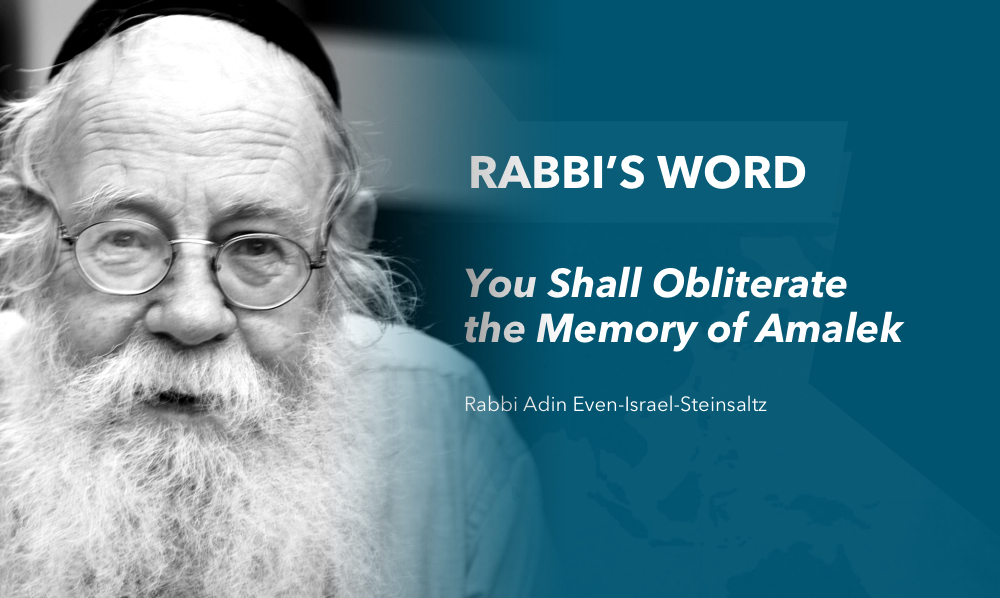- 09/03/2020

We continue cooperation with the institute of Rabbi Adin Even-Israel Steinsaltz and publish specially prepared material for the communities of the EAJC members.
Throughout history, the Jewish People has suffered from the heavy blows of many enemies. Nevertheless, we are commanded to exact revenge from and totally destroy Amalek alone. Amalek is deserving of such special treatment due to the degree of its meaningless and groundless hatred towards the Jewish People.
Amalek’s hatred of Israel stems from the clash of two forces that are always at odds with each other: no matter at what spiritual level, the Jewish People are endowed with an innate consciousness and faith. Even when it appears that all hope is lost, that the world is arbitrary, the Jewish People maintain their unadorned faith. This faith has neither rhyme nor reason; it is without rationale. The Jew himself does not know why he believes, but he does so nonetheless. This is the stubbornness of faith, which reaches to the very root and foundation of the “stiff-necked” Jewish People in which is latent the resolve not to submit to the world and to the forces of evil, but to hold fast always to God and His Torah. Conversely, Amalek is the nadir, the basest of the forces of evil.
“A war for the Lord against Amalek from generation to generation.” (Shemot 17:16) refers to the eternal war of faith against heresy, the war of the godly forces, the bearers of light in the world, against those who stand for doubt and feebleness of mind. This war continues as long as Amalek exists in the world in any form, as long as the seed of Amalek – the seeds of doubt and indifference of heart sown in the world by Amalek – still remains in Israel’s heart.
Haman’s hatred stems from this same Amalekite root. Of course, the Megilla relates how Mordekhai personally angered Haman, but Haman’s generalization to include all of “Mordekhai’s people”’ points to prejudice — a basic hatred of Israel. Haman’s contentions, like the anti-Semitic contentions in every generation, are perhaps factually correct – “There is a certain people, scattered and dispersed among the other peoples… whose laws are different from those of every other people; theydo not obey the king’s laws.” (Esther, 3:8). But his struggle against the Jewish People does not stem from these reasons, but from a basic hatred toward those who belong to another pole of existence. Haman and his cronies stand on one side, and the Jews on the other, the side of faith. Amalek would like to uproot God from the world, and because it cannot do so, it turns to God’s representatives on earth — the Jewish People. Most people sin because, due to a mistaken notion or a spirit of folly, the transgression seems good in their sight, not because of an intrinsically evil will. Amalek, who “hates for the sake of hating”, is defined as evil itself, and for that reason it belongs to the category of the world’s imperfect existence.
In our spiritual life as well, the “eradication of Amalek” applies at all times, in every generation, and within every individual. This inner battle is essentially no different from the external eradication of Amalek.
The numerical equivalent of “Amalek” is the same as the word “safek” (doubt), alluding to its inner nature. Legitimate doubt – when there is something that a person does not know conclusively – is removed when the matter in question becomes clear and when he deals with the problems that it raises.
Amalek seeks to encourage and perpetuate doubt through the disengagement of thought and feeling. Were the heart to feel all that the mind understands, there would be no room for doubt at all. In practice, however, insights grasped clearly in the brain are obscured when they descend to the emotional realm – and there, doubt is given a foothold. A person’s life is full of exalted emotions and profound thoughts, but the transition between thought and feeling and between feeling and action involves enormous difficulties – the inner war against Amalek.
The disengagement of mind and feeling does not pertain to Amalek alone. In fact, it is a universal human problem, which the Kabbala terms “meitzar hagaron,’ “constriction of the throat.” The centers, the brain and the heart, are not linked; there are barriers between them” that prevent a connection and separate understanding from feeling and enthusiasm.
The disengagement of understanding and feeling is the source of all the evil that human beings perform. A person may know with certainty that a particular deed is not good, but do it nonetheless. Conversely, there are deeds that we know should be done, but our hearts remain unmoved and do not encourage us to do them.
There is a second kind of doubt that belongs to Amalek alone. This is the level of “the root of Amalek,’ doubt that requires no arguments to maintain, but which stands on contrariety alone. This is the doubt of “one who knows his Master and yet intends to rebel against him” (Sifra, Bechukotai, 2) – the recalcitrance that brings one to ask in every situation, “So what?” “But why?” Jewish faith teaches that there is a divine power that directs the world; that God’s power pervades the universe – God watches over everyone at all times with His providence. Amalek, on the other hand, injects coldness into our hearts, the feeling that one need not get so excited, that one can take the world less seriously. From the Amalek within us sprouts the doubts, the concerns, the conjectures — “Maybe…,” “Perhaps…” Even at the greatest spiritual heights, when a Jew attains full awareness and perception of the divine light which pours over him, Amalek stands in the way. With recalcitrance and defiance encompassing all the forces of evil, Amalek whispers, “Perhaps all this is nature, for everything is nature; there is no divinity in the world”.
At some point during childhood, it occurs to many children that their parents may not be their real parents. Such a thought usually stems from the fact that the child feels slightly alienated, and on this he builds theories and castles in the air. Similarly, Amalek, through foolish and unfounded ideas, succeeds in creating doubts about faith. Ihe doubt is not created on a particular basis or because of a particular argument, but due to the very existence of the world of chaos, and if it is allowed room, it will grow.
Now let us ask: how can we deal with the doubts of Amalek? Not for naught is the struggle against Amalek called “obliterating Amalek.” To obliterate the memory of Amalek means to erase it completely. The way to deal with Amalek is by ignoring it and its questions. Amalek is intrinsically incapable of being persuaded, for its arguments do not stem from the realm of cause and effect. Were they to stem from logic, the moment I would deal with the cause and reject it, the effect would be mitigated. The complete obliteration of Amalek is achieved only when “with their own eyes they will see,”‘(Yeshayahu 52:8) when there will be absolute certainty through inner insight.
Until the time of that clear vision comes, there is the festival of Purim, the festival of the war against Amalek, a festival that is not based on the rational. Moreover, the very nature of one of the day’s mitzvot is loss of lucidity. Amalek cannot be beaten with the help of the intellect or by means of argument and persuasion. Amalek must be approached on a plane unrelated to the intellect, where one rejects and does away with Amalek entirely — to remove oneself from doubt.



